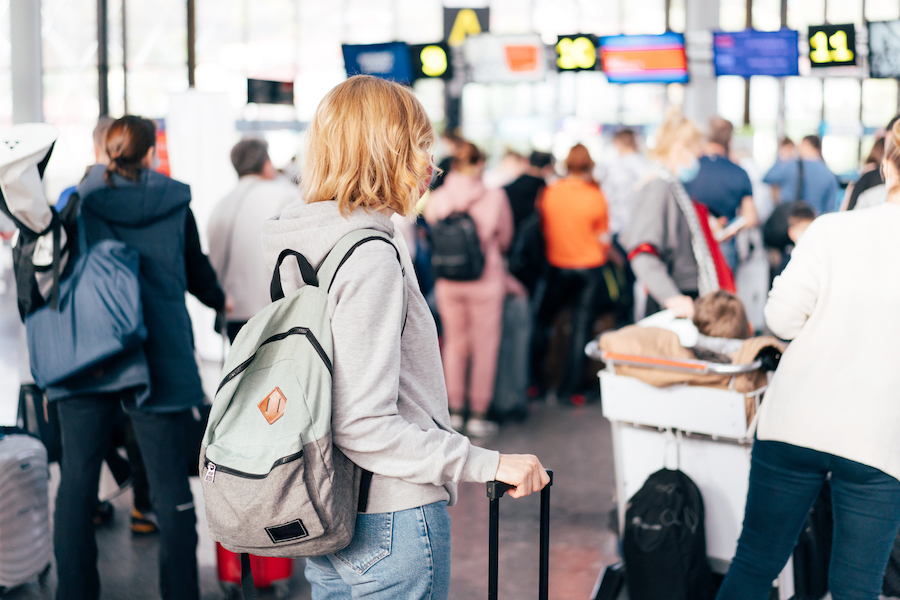New Federal Task Force to Review Canada’s Immigration
Will Tackle Passport Offices and Application Processing
Travel has become increasingly frustrating for Canadians due to delays with passport processing. To tackle this issue, the federal government has created a special task force to expedite passport and immigration applications, reports Global News.
When announcing the new task force, Prime Minister Justin Trudeau said the federal government knows the delays are unacceptable and is committed to improving the delivery of services in a timely and efficient manner.
He also noted that the government aims to continue providing high-quality services to Canadians while meeting their changing needs.
Ten cabinet members will lead the new committee, which will review the delivery of services and identify areas for improvement. The committee is expected to outline short- and longer-term solutions that would reduce wait times, clear backlogs, and improve overall service quality.
The task force will also monitor external issues, such as labour shortages around the world, which contribute to delays at home and abroad.
So, What's Happening Exactly?
The demand for Canadian passports has been so high, that it has led to delays in processing times. While many Canadians are anxious to travel, some passport seekers have even been forced to camp outside service centres or reschedule their trips because of the bureaucratic lull.
Between April 1, 2020, and March 31, 2021, 363,000 passports were issued. From April 1st, 2021 and March 31, 2022, 1,273,000 passports were issued. The numbers showcase how many Canadians are yearning to leave the country.
The high demand for passports directly correlates to massive lines at the airports.
New Passport Renewal Process For Applicants
The sudden influx of passengers has prompted Service Canada to hire and train more employees. Their spokesperson said that around 600 new people have been employed in the last year, and around 600 people have been reassigned to passport service delivery.
Service Canada has also created a new process for applicants.
You can now renew your expired passport (if it was issued in the last 15 years) without providing your original documents, like proof of citizenship. You now need two photos, two references, the completed form and the applicable fees.
Application Processing Standards Back to Normal Soon?
Immigration Minister Says the IRCC Is Almost Back on Track
Immigration Minister Sean Fraser says that big steps are being taken to get the immigration system back on track. Since the start of the pandemic, the IRCC has been facing a major application processing backlog. However, CIC News reported that Minister Fraser is working hard to end that.
“The good news is I see light at the end of the tunnel…we’re on track right now to restore our pre-pandemic service standard by the end of this calendar year for virtually every line of business,” Fraser said
Returning to Normal By The End Of The Year
As the Minister explained, there were two main causes of the backlog: the pandemic-related IRCC closures and travel restrictions.
In an attempt to curb the processing delay, the IRCC favoured applicants already within the country and focused on transitioning those in Canada to permanent residence. This effort was followed by a commitment to resettling 40,000 Afghan refugees in August 2021 and assisting Ukrainians in February 2022. Since then, around 9,105 Afghans have arrived to Canada and about 51, 383 Ukrainians have found refuge in the country.
Read More: Immigration Minister Pressed on Afghans
The Solutions for Improving Client Experience and Address Backlogs
According to the Minister, resources, policy, and technology and the keys to improving the immigration system.
As it stands, 500 more staff were added and around $470 million of federal funding was added to the budget to improve application processing. With regards to technology, a "digital platform” to modernize and increase the reliability of our system is essential.
These measures are starting to have an impact - more than 200,000 permanent residents landed in Canada so far this year, and work permit approvals have increased by almost 250% compared to last year.
Despite these wins, there continue to be challenges with the processing times.
"My sense is by the end of this calendar year, new applications coming in will have the kind of certainty that we’ll be able to meet our service standard and people will be dealing with 60 days or 6 months or 12 months, not an undetermined period of time,” noted Fraser.
Read More: Canada Planning Major Express Entry Changes
All-Program Draws for Express Entry to Resume on July 6
Express Entry Commitment Upheld by IRCC
In an interview with CIC News, Immigration Minister Sean Fraser said Canada will resume all-program Express Entry draws on July 6.
According to Fraser, the IRCC is on track to normalize Express Entry draws in early July. As part of its April commitment, IRCC promised to get the Express Entry service standard back to six months once all-draws begin again.
Because of the pandemic, IRCC stopped sending Express Entry invitations to apply to Federal Skilled Worker Program (FSWP) and Federal Skilled Trades Program (FSTP) candidates in December 2020. It did the same for Canadian Experience Class (CEC) candidates in September 2021.
Recent developments in Express Entry
Before the pandemic, the IRCC would usually take all of the candidates into consideration during its biweekly Express Entry draws. They would invite the candidates who scored the highest on the Comprehensive Ranking System (CRS), regardless of their program of eligibility.
The Immigration agency changed its approach during the pandemic. FSWP and FSTP draws have been paused, since it made more sense to prioritize economic immigrants in Canada while the country was under international travel restrictions. So, for most of last year, IRCC prioritized CEC candidates and achieved its goal of landing 401,000 new permanent residents.
However, this resulted in a massive backlog of applications from other programs. To control its backlog inventory and improve its Express Entry service standard, IRCC decided to also pause Express Entry invitations to CEC candidates in September 2021.
At the same time, the IRCC has continued to offer invitations for Express Entry to candidates for Provincial Nominee Programs (PNP) as a way to contribute to the economic development of provinces and territories.
How Will The All-Program Draws Affect Express Entry Candidates?
The return to all-program draws will benefit FSWP, FSTP, and CEC candidates alike.
World Education Services (WES), one of the ECA providers designated by IRCC, found that despite the pandemic's aftermath, FSWP candidates are still very interested in going ahead with the Canadian immigration process.
Meanwhile, the resumption of draws for CEC candidates will help those currently living in Canada maintain their residency status. If an Express Entry candidate gets an invitation to apply for permanent residence (ITA), the candidate can apply for a Bridging Open Work Permit (BOWP) as well. That allows them to maintain their legal status in Canada until the process is finalized.
Since September 2021, CEC candidates have not been able to take advantage of the BOWP. Due to this, IRCC announced in April that it would offer a work permit extension this summer to the main cohort of CEC candidates. This cohort includes those whose Post-Graduation Work Permit (PGWP) has recently expired or is about to expire.
IRCC has not announced when it will begin accepting work permit applications from these individuals.
Canada Struggling With Finding Workers
Record-high Job Vacancies In the First Quarter Of 2022
The number of job vacancies in Canada is just shy of one million. In the first quarter of 2022, job vacancies in Canada climbed to 957, 500 - the highest ever number, according to Statistics Canada. Although labour shortages were an issue prior to the pandemic, COVID-19 exacerbated the numbers.
Read More: Canada’s Immigration Forecast for 2022
The ‘great resignation’ can be seen in most sectors across the country. Currently, the healthcare and social assistance sector have 136,800 vacancies. Construction, manufacturing, and retail sectors are also experiencing this shift.
Read More: Canada Planning to Welcome 1.3 Million Immigrants
Across the country, the unemployment to job vacancy ratio was 1.3 in the first quarter, down from 2.2 before the pandemic. Despite the number of unemployed workers decreasing as job vacancies increase, the ratio varies across the provinces.
In Quebec and British Columbia, there was less than one unemployed person for every job vacancy, but in Newfoundland and Labrador, there were almost four unemployed people for every vacancy. Low ratios indicate a tight labour market and possible labour shortages. Because of this, Canadian employers are expected to experience some hiring challenges.
In a recent Canadian Survey on Business Conditions, two-fifths of business owners reported that recruiting skilled employees was an obstacle, and retaining employees was an obstacle for about thirty percent. Learn how to apply for a work permit here.
Read more: Interest In Immigrating To Canada Is Still High
New Canadian Immigration Program in the Making
New Program For Temporary Residents And Express Entry Changes
Canada is working on a new immigration program for temporary foreign workers and international students. In an interview with CBC News, Immigration Minister Sean Fraser explained that the new program will be similar to the Temporary residence to Permanent Residence program.
"We are looking right now at the best path forward to create a permanent pathway for temporary residents,” Fraser said to CBC News.
Last year, the temporary resident-to-permanent resident pathway - or TR to PR - was implemented for eight months after COVID-19 lockdowns closed the border to newcomers to prevent the spread of the virus. It resulted in 90,000 essential workers, front-line health care workers and international students becoming eligible for permanent residency.
After the announcement, Fraser now has 120 days to develop and release a strategy to set this program in motion. This timeline was dictated by a motion in the Commons last month.
“That actually puts me on a clock to come up with a framework to establish this new permanent residency pathway, not just for international students, but also for temporary foreign workers,” Fraser said.
How to come to Canada as a temporary resident?
It's not always necessary to be in Canada to be eligible for an immigration program, but studies have shown that if you have Canadian experience, you may have better chances of getting a job sooner. If you study or work in Canada, that might help even more.
To be able to study in Canada, you need to get accepted to a Designated Learning Institution and obtain a study permit. After you graduate from a full-time program, you’re eligible for a Post-Graduation Work Permit and get a job.
Read More: How To Get a Canadian Study Permit?
To be able to work in Canada, you need a work permit. There are more than a hundred work permit options and streams you can apply through, but they're divided into two main categories - Temporary Foreign Worker Program (TFWP) and International Mobility Program (IMP). The biggest difference between the two is that the TWFP work permit needs employers to complete a Labour Market Impact Assessment, while IMP work permits do not. The latter exists to support Canada's social, economic, and cultural priorities.
Express Entry Changes
The Senate is currently in the process of reviewing Bill C-19, and it is expected to become law soon. The law will grant the IRCC the authority to invite Express Entry candidates based on economic goals, such as occupation, proficiency in French, and education. The IRCC will also be required to engage in a public consultation program to help select which groups of candidates to invite. Additionally, the IRCC will have to annually report the economic goals of each instance sought to the Parliament.
Read More: Canada Planning Major Express Entry Changes





